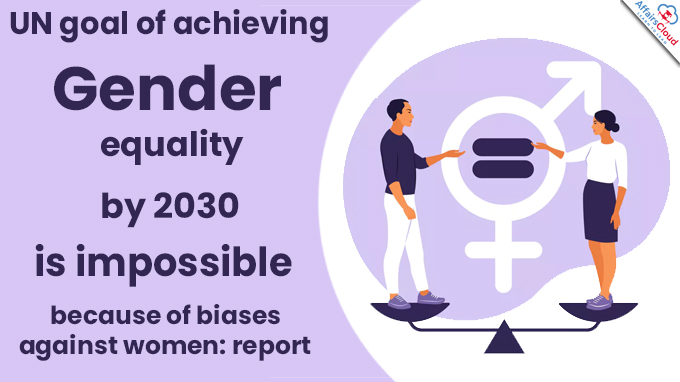 United Nations (UN)’s report titled “Progress on the Sustainable Development Goals: The gender snapshot 2023” states that the world is failing in its efforts towards achieving Sustainable Development Goals(SDG) 5: gender equality, due to the biases against women around the world in health, education, employment and the halls of power.
United Nations (UN)’s report titled “Progress on the Sustainable Development Goals: The gender snapshot 2023” states that the world is failing in its efforts towards achieving Sustainable Development Goals(SDG) 5: gender equality, due to the biases against women around the world in health, education, employment and the halls of power.
- This is the latest edition of the annual series jointly produced by of the UN Women(UN Entity for Gender Equality and the Empowerment of Women) and UN Department of Economic and Social Affairs (DESA).
- The report provides a comprehensive analysis of gender equality progress across all 17 SDGs.
- The report also highlights prevailing trends, gaps, and recent setbacks on the journey towards achieving gender equality by 2030.
Key Findings:
i.If current trends continue, by 2030, more than 340 million women and girls will remain in extreme poverty, and nearly one in four will experience severe food insecurity.
- Climate change could worsen this, impacting an additional 236 million women and girls in the worst-case scenario.
ii.The gender gap in power and leadership positions remains entrenched, and, if things keep going as they are, the next generation of women will still spend on average 2.8 more hours per day on unpaid domestic work than men.
iii.54% countries still lack laws in all key areas of gender equality, including on equal rights to enter marriage and initiate a divorce.
iv.Barriers: The active resistance to gender equality and chronic underinvestment, with unequal access to healthcare, political representation, economic disparities, and a lack of legal protection are the key barriers to progress.
v.Poverty: About 1 out of every 10 women(10.3%), lives in extreme poverty with less than USD 2.15 a day.
- By 2030, about 8% of all the world’s women will still be living in extreme poverty (a lot of them will be in Sub-Saharan Africa).
vi.Education: It estimates that up to 129 million girls may be out of school globally in 2023. If current trends persist, an estimate of 110 million girls will still be out of school in 2030.
vii.Child Marriage: Globally, 1 in 5 young women (19%) is married before age 18.
viii.Wages: Around 61.4% of women in age group 25 to 54 were into the labour force(against 90.6% of men) in 2022 and paid far less.
- In 2019, for each dollar earned by men in labor income, women earned only 51 cents.
Key Points:
Science and Technology:
i.Gender barriers continued to restrict women’s participation in crucial roles for the future of science, technology, and innovation.
- In 2022, the representation of women among inventors listed on international patent applications was only one-fifth that of men.
ii.In 2020, women held only 1 in 3 research positions worldwide and only one in five science, technology, engineering and maths (STEM) jobs
Legislation:
Globally women hold only 26.7% of parliamentary seats, 35.5% of local government seats, and only 28.2% of management positions at work.
Promotion of Peace:
Global conflicts are on the rise, with a notable increase in the number of women and girls living in conflict-affected areas.
- In 2022, it was 614 million, marking a 50% increase compared to 2017.
The need of the hour:
According to the report, an annual investment of USD 6.4 trillion is needed by 2030 in 48 developing countries (70% of population) to realise gender equality across various crucial domains.
- The report advocates for a boost in financial support for initiatives aimed at advancing gender equality and empowering women.
Caution:
i.If current government spending patterns persist, there will be an annual deficit of USD 360 billion.
ii.With the current slow pace of change, women’s share of workplace management positions will reach only 30% by 2050.
iii.None of the indicators are at “target met or almost met”
- 2 indicators are “close to target”; 8 indicators are at a “moderate distance to target”; 4 indicators are “far or very far from target” and 4 indicators lack sufficient data to assess at global level.
iv.A continued failure to prioritize SDG 5 will put the entire 2030 Agenda for Sustainable Development in peril.
Recent Related News:
According to the report titled “Tracking SDG7: The Energy Progress 2023” released on 6th June 2023, around 2.3 billion people across the globe are still using polluting fuels and technologies for cooking and around 675 million people did not have access to electricity in 2021.
About UN Women(UN Entity for Gender Equality and the Empowerment of Women):
Executive Director – Sima Bahous
Headquarters – New York, United States of America(USA)
Established in – 2010
About United Nations Department of Economic and Social Affairs (DESA)
Under-Secretary General – Li Junhua
Headquarters – New York, United States of America(USA)
Established in – 1955




